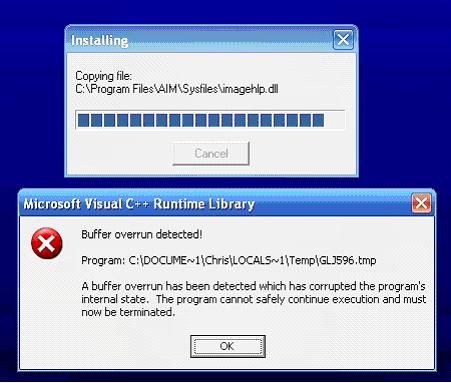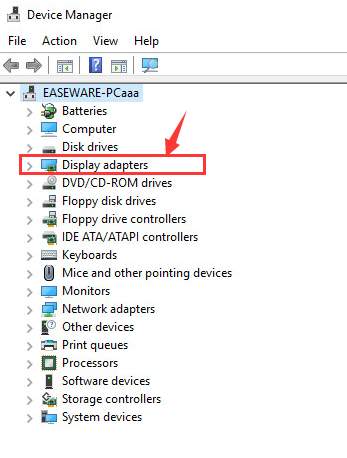


- MICROSOFT VISUAL C RUNTIME LIBRARY BUFFER OVERRUN UPDATE
- MICROSOFT VISUAL C RUNTIME LIBRARY BUFFER OVERRUN PORTABLE
- MICROSOFT VISUAL C RUNTIME LIBRARY BUFFER OVERRUN VALIDATION CODE
By setting this define value to 1, an exception will be thrown instead of calling the invalid parameter handler. This can be done by using the #define value of _SECURE_SCL_THROWS. If you go out of range with a checked iterator, an “invalid parameter” routine will be called.Īgain, you can avoid the invalid parameter and have an out-of-range exception thrown instead. SCL checked iterators and debug iterators have been updated for security reasons.
MICROSOFT VISUAL C RUNTIME LIBRARY BUFFER OVERRUN UPDATE
It is recommended, however, that you update your code to use the secure versions. If you want to continue to use the old, insecure versions of these functions, you can use a #define value of _CRT_SECURE_NO_DEPRECATE. For example, functions include strycpys ,wcscpy_s, mbscpy_s, calloc_s, and strcat_s. The new, secure versions have been given a suffix of _s to make them easily identifiable. These are functions such as strcpy, strcat, and so forth. Most of the deprecated functions can cause a buffer overrun or other security issue, if improperly used. Warnings for Insecure APIsĪ set of functions within the CRT has been deprecated. If you are passing invalid parameters, this will break your code. As long as you are passing valid parameters, this will not be an issue.
MICROSOFT VISUAL C RUNTIME LIBRARY BUFFER OVERRUN VALIDATION CODE
Parameter validation code will invoke an invalid parameter routine. For example, if you pass a destination buffer whose size is smaller than necessary to strcpy, you can cause a security risk. In the C Runtime Libraries, code has been added to validate parameters. Before upgrading to Visual C++ 2005, you should verify that you don’t have any of these issues in your application code. There are a number of changes in the Visual C++ 2005 Libraries that could break your existing application code. Ten Breaking Changes in the Visual C++ Library If the cost isn’t justified, there is obviously no point in implementing it. Finally, a coding change must have enough value to justify the cost of making the change. This can be changes because of breaking code or because it adds cost. A change will also be avoided if it could seriously cause people to avoid adopting or upgrading to 2005. Source compatibility will be broken before binary compatibility will be. If these changes impact backward binary compatibility, the change may not happen. Most changes to Visual C++ are at the source code level. Microsoft wants to insure there is a well-defined and consistent behavior within Visual C++. There are better alternatives and the time previously spent maintaining this can now be focused on more important issues.įinally, a breaking change may be added in order to increase the reliability of the VC++ compiler. As an example, single-threaded CRT was removed from Visual Studio 2005 because it really wasn’t needed. For example, low-value features may be removed from the product to eliminate the need to continue to maintain them. Maintenance can also be a cause for making breaking changes. It will now be easier for vulnerabilities to be patched and fixed. This allows for easier updateability of the binary files in VC++. Serviceability has also been added to the product. It also introduced the security checks that are on by default now. It introduced a secure CRT and deprecated the unsecure APIs. To help alleviate the number of security issues and to make code less error prone, Visual C++ 2005 has a number of changes. C++ allows you the power to do nearly anything. Security has been a very hot topic over the past few years and will continue to be critical going forward. To gain this conformance, some things that were allowed in the past may no longer work. Conformance to the standards will also be the default settings in Visual C++ 2005. Things such as lifetime of variables declared inside a for scope (for-scoping) and variable types will now fit the C++ standards.
MICROSOFT VISUAL C RUNTIME LIBRARY BUFFER OVERRUN PORTABLE
This allows for more portable code across platforms and into other tools. One of the key features of Visual C++ 2005 is that it is even more conformant with the C++ standards. Even so, there are a number of reasons for breaking code in a new edition: It is considered very serious when a change is being made to Visual C++ that could break prior code. The Visual C++ team has an entire process for considering changes in the product. As developers using Visual C++, you should be aware of these changes before you upgrade. These changes have not been made casually-generally there is a strong reason for the change. There will be a number of changes in Visual C++ 2005 that will break past programs. This information is based on a presentation and feedback by Brandon Bray (Visual C++ Program Manager), Alvin Chardon, and Sri Vasudevan. In this article, I present a number of changes that can already be found in Visual C++ 2005 that you may encounter when upgrading your own programs.

There are a number of changes that you can expect to see in Microsoft Visual C++ 2005.


 0 kommentar(er)
0 kommentar(er)
